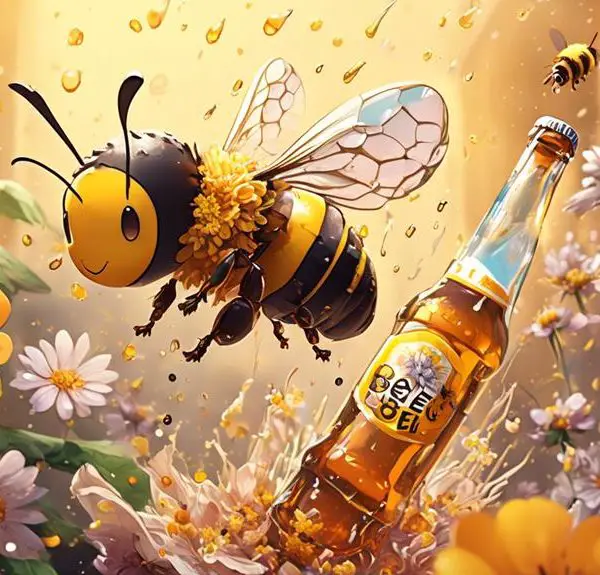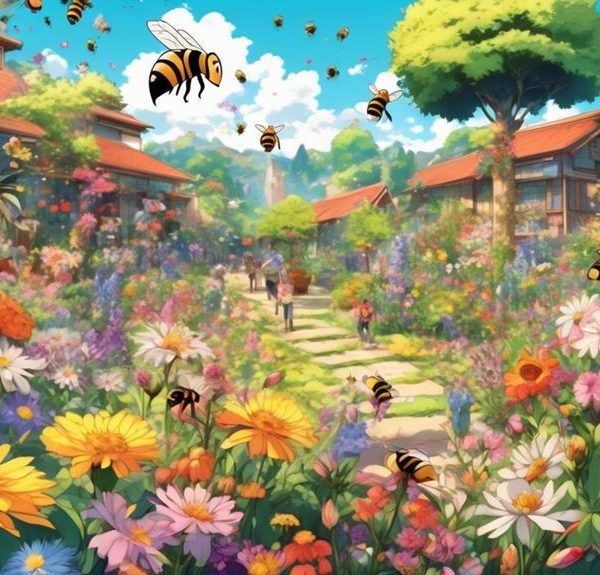Pondering on bees' dietetic preferences, could they be secret algae enthusiasts? Dive in to explore this intriguing possibility.
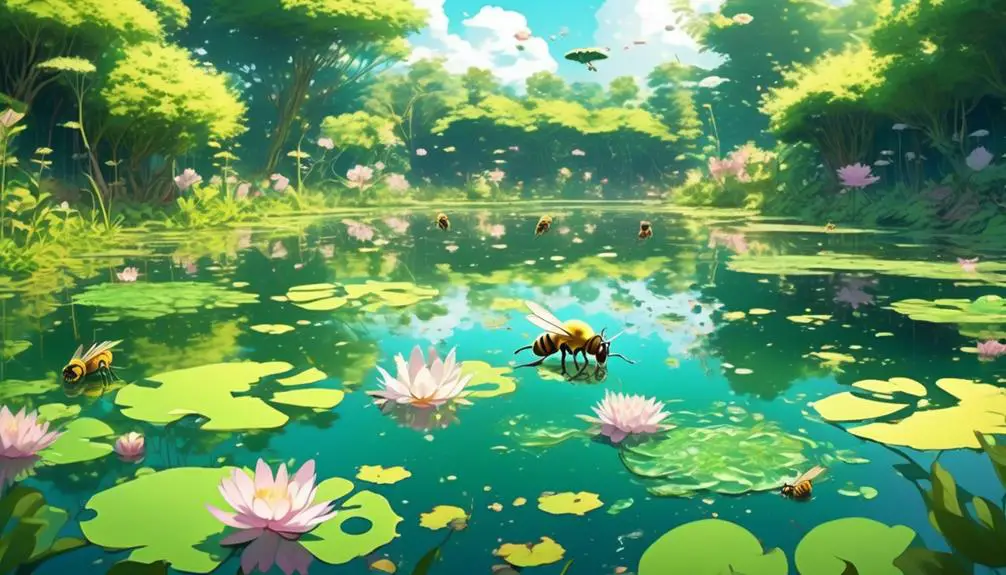
Do Bees Like Algae?
Diving into the world of bee diets is like exploring a microcosm of uncharted culinary preferences. You've likely drawn conclusions about these buzzing pollinators favoring the sweet nectar from flowers, but have you ever considered the unlikely possibility of bees being attracted to algae?
It's an unconventional thought, isn't it? Yet, as you venture further into this discussion, you'll find intriguing studies and observations that might just challenge your initial assumptions. Are bees secret algae enthusiasts? Well, that's an enigma we're about to tackle.
Key Takeaways
- Bees have not naturally evolved to be attracted to algae due to the lack of visual and olfactory cues.
- Algae, such as spirulina and chlorella, are protein-rich superfoods that could potentially benefit bee health and colony productivity.
- Certain types of algae contain fatty acids and antioxidants that boost bee health and development.
- Further research is needed to fully understand the implications of algae as a food source for bees, including the potential risks of harmful toxins from certain types of algae.
Understanding Bee Dietary Preferences
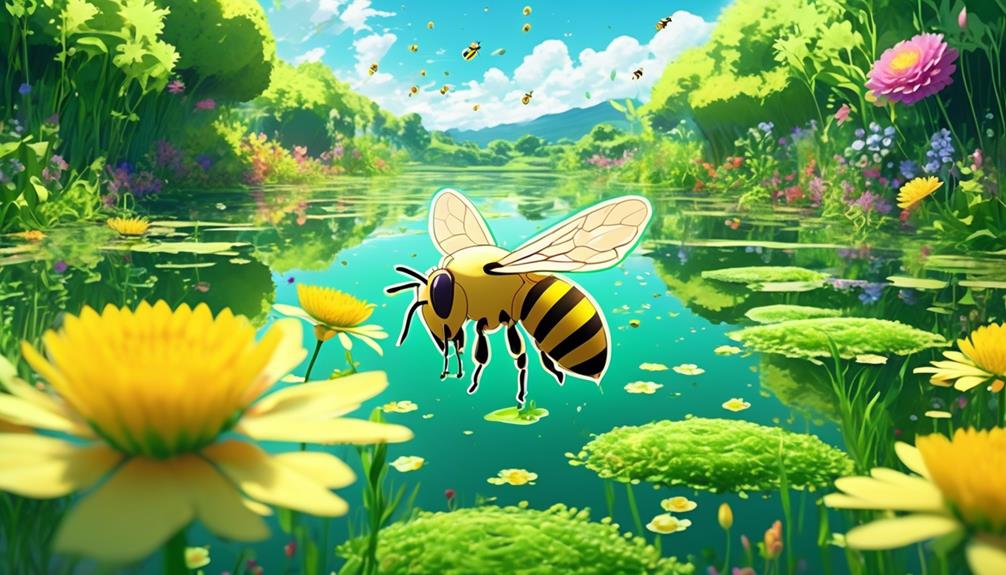
To understand a bee's dietary preferences, it's vital to delve into their inherent attraction to certain types of plants and flowers, and investigate if this attraction extends to algae. You see, bees have co-evolved with flowering plants for millions of years. This symbiotic relationship has shaped their preferences towards bright, fragrant blossoms that provide them with nectar and pollen, their primary food sources.
Yet, could algae, typically a food source for aquatic animals, be appetizing to bees? It's not as far-fetched as you might think. Some algae species, particularly microalgae like Spirulina, are protein-rich and have been studied as potential supplements for bee diets.
However, there's a significant caveat: bees aren't naturally drawn to algae as they're to flowers. Algae lack the visual and olfactory cues that attract bees. So, even if algae offer nutritional benefits, bees won't forage for them unless conditioned to do so.
Therefore, while algae could theoretically supplement a bee's diet, it's not a natural part of their food preference. This understanding is crucial in our efforts to support bee populations and their vital role in our ecosystems.
The Nutritional Value of Algae
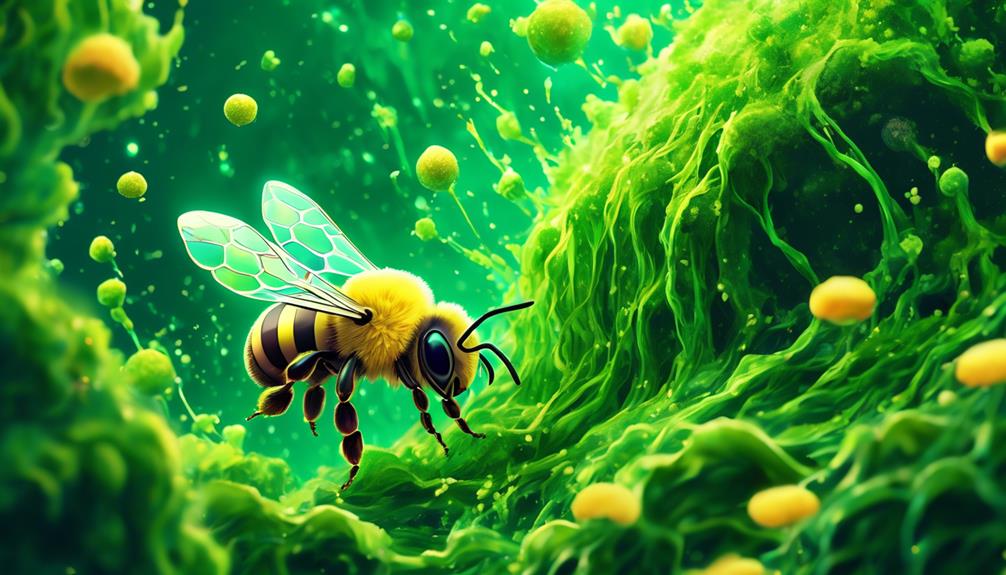
While bees may not naturally seek out algae, let's explore the nutritional potential of this unconventional food source, particularly its protein content and other benefits that could contribute to bee health. Algae, particularly spirulina and chlorella species, are protein-rich superfoods that could offer a vast array of nutrients. They're packed with vitamins, minerals, and antioxidants that could boost bee health.
Take a look at the table below to understand the nutritional profile of algae:
Nutrient | Spirulina | Chlorella |
|---|---|---|
Protein | 60-70% | 50-60% |
Vitamins (B1, B2, B3) | High | High |
Minerals (Iron, Magnesium) | High | High |
These numbers can't be ignored. Imagine the potential benefits if bees could be encouraged to feed on these nutrient-dense algae. They could develop stronger immune systems, potentially reducing colony losses. Moreover, the high protein content could help in brood development and overall hive productivity.
Algae: A Potential Food Source for Bees?
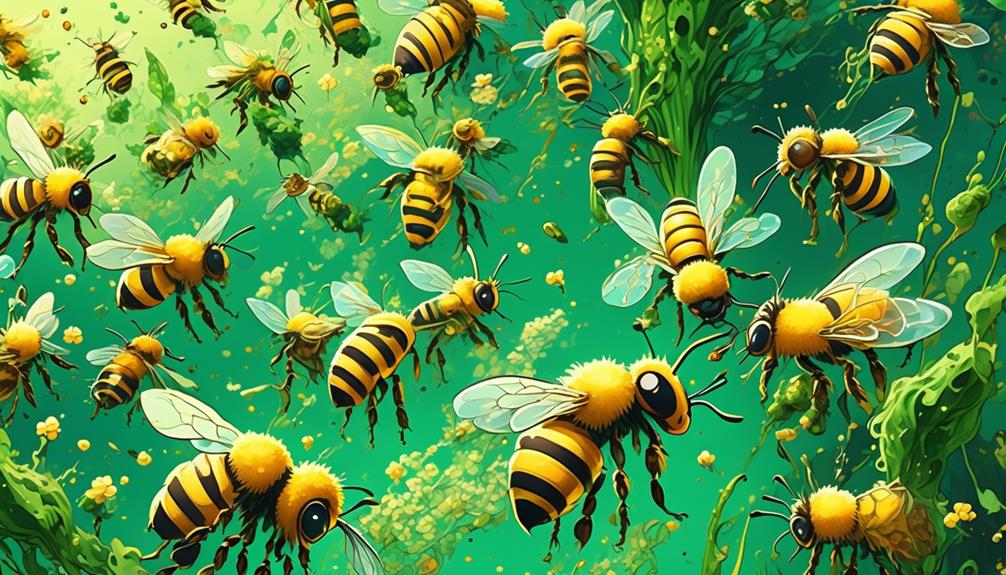
Could algae's nutrient-rich profile make it a viable food source for bees, bolstering their health and productivity? It's a possibility that's being explored with increasing attention. Algae, as you may know, is a powerhouse of nutrients, packed with proteins, vitamins, and minerals. It's this nutritional punch that makes it a potential candidate for bee food.
When bees forage, they're not just looking for sugars, they're seeking nutrients to support their entire hive. This is where algae could come into play. Algae's protein content, for instance, could support bee growth and development. Moreover, certain types of algae contain fatty acids and antioxidants, which could boost bee health and resistance to disease.
But it's not just about the nutrients. Algae has another advantage: it's a year-round food source. Unlike flowers, which bloom seasonally, algae is constantly available. This could help ensure bees have a steady food supply, especially during the colder months when floral resources are scarce.
More research is needed, of course. But the potential of algae as bee food is intriguing. If successful, it could have significant implications for bee health and, by extension, our global food system.
Field Studies: Bees and Algae Interaction
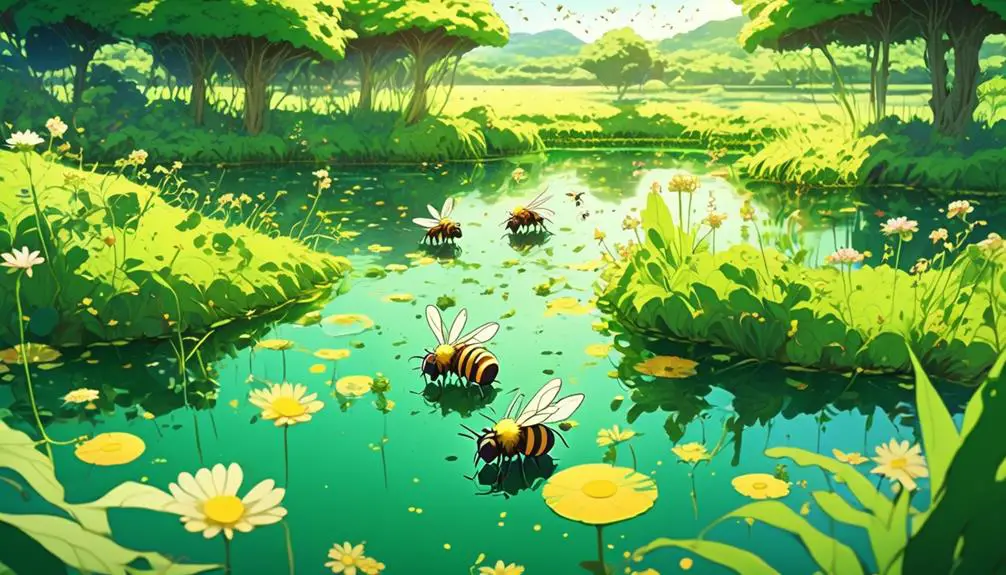
In the realm of scientific exploration, researchers have conducted field studies to observe firsthand how bees interact with algae. You'll find that these studies provide invaluable insights into the complex relationship between bees and algae.
In one study, researchers noticed that bees were frequently visiting bodies of water with dense algal blooms. Through careful observation, it was found that bees weren't just sipping the water, but they were actively seeking out the algae. In fact, they were seen collecting the slimy algae into their pollen baskets, indicating that they might be using it as a food source.
Further investigations revealed that bees fed with algae showed no adverse effects on their health or behavior. On the contrary, some studies noted an increase in the bees' activity levels, suggesting that algae could be providing them with nutritional benefits.
However, it's important to note that not all algae are beneficial for bees. Some types of blue-green algae can produce toxins that are harmful to bees. Therefore, while algae hold potential as an alternative food source for bees, further research is needed to comprehensively understand the implications of this interaction.
Therein lies the challenge, and the intrigue, of this ongoing scientific exploration.
Implications for Bee Health and Conservation
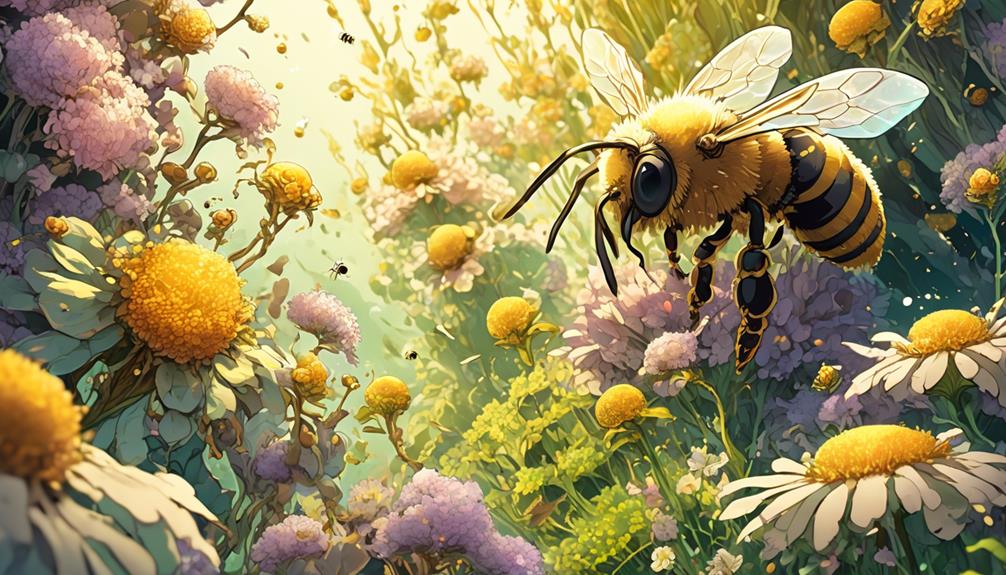
Exploring the role of algae in bee health and conservation opens up exciting new avenues in entomology, potentially offering novel solutions for bee survival and well-being.
You see, algae isn't just a simple plant; it's a potential powerhouse of nutrition for bees. It's packed with proteins, fats, and minerals that bees need to thrive.
Research suggests that algae could serve as a supplementary food source for bees, especially during seasons when nectar and pollen are scarce. This could significantly enhance bee health, bolstering their resistance to diseases and pesticides. It's not a stretch to see how this could lead to improved bee colony resilience and survival rates.
Algae could also play a pivotal role in bee conservation efforts. By cultivating algae in bee habitats, we could potentially create more sustainable environments for these vital pollinators. The more diverse and resilient a bee's diet, the stronger the population.
Innovative Approaches: Algae-Based Bee Feed
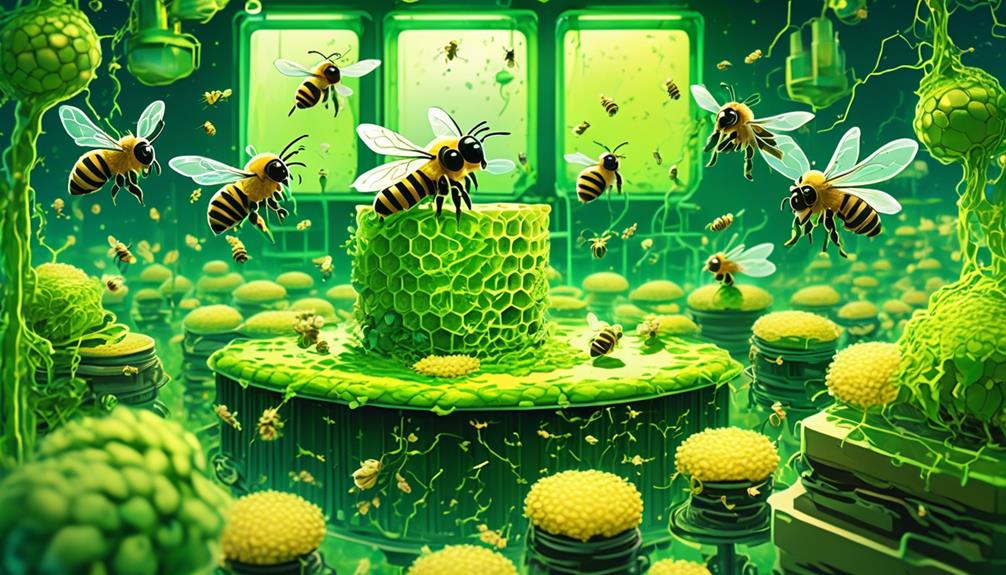
While you mightn't have considered it before, the concept of algae-based bee feed is an innovative approach that's gaining ground in scientific circles. This method involves utilizing algae as a sustainable, nutrient-rich food source for bees. It's not just conjecture; studies have shown that certain algae species, like Spirulina, contain essential nutrients that can supplement a bee's diet, potentially improving their overall health and resistance to diseases.
But how do you feed bees algae, you may ask? The answer lies in the creation of algae cakes, a process that involves dehydrating and compacting the algae into a form that's consumable by bees. These nutrient-packed patties can be placed in hives where they're readily available for bees to feast on.
The potential benefits of this approach are twofold. First, it could provide a solution to the diminishing food sources affecting bees due to changes in their natural environment. Second, it could enhance the bees' health, making them more resilient to various threats like pesticides and parasites.
However, before this approach can be widely adopted, further research is needed to determine its long-term effects on bee health and behaviour. But it's certainly a promising avenue in bee conservation efforts.
Frequently Asked Questions
Can Bees Survive Solely on a Diet of Algae?
No, bees can't survive solely on a diet of algae. They require a diet of nectar and pollen from flowering plants. Bees get their energy from nectar, and pollen provides the necessary proteins and fats.
Algae, while it may contain certain nutrients, doesn't provide the specific dietary needs of bees. Without access to their preferred diet, bees' health and survival would be seriously compromised.
How Does the Taste of Algae Affect a Bee's Willingness to Consume It?
While you might think algae's taste could be off-putting to bees, it's not quite that simple. Bees don't perceive taste like we do. They're more attracted to certain chemical compositions than flavors.
If algae contains the nutrients they need, they'll consume it. But currently, there's no definitive research showing bees regularly eat algae.
What Are the Potential Dangers of Bees Consuming Algae?
While there's limited research on the effects of algae on bees, potential dangers could arise from toxins present in some algae species. You'd need to consider harmful algal blooms which can produce neurotoxins. These could affect a bee's navigation or even be lethal.
Also, the nutritional value mightn't meet a bee's needs, potentially leading to malnutrition. It's important to study these risks more precisely to protect our vital pollinators.
How Does Algae Consumption Affect the Honey Produced by Bees?
When bees consume algae, it can impact the quality of honey they produce. Algae, unlike typical nectar sources, may introduce different flavors and potentially harmful substances. You'd notice a change in honey's taste, color, or even its health benefits.
More research is needed though, as the specifics of these changes depends on the type of algae consumed. So, it's not just about if bees like algae, it's also about how it changes their honey.
Are There Specific Types of Algae That Are More Beneficial for Bees?
You're onto something here!
Yes, certain types of algae, such as spirulina, are indeed more beneficial for bees. They're packed with essential nutrients that boost bee health and immunity.
However, not all algae types have the same positive effect. It's crucial for beekeepers to research and select the right kind of algae.
It's a fascinating field of study, isn't it?
Conclusion
In conclusion, bees may indeed find algae palatable. The nutritional richness of algae could potentially supplement bee diets, as field studies suggest.
This interaction between bees and algae could have significant implications for bee health and conservation efforts. Innovative approaches, like algae-based bee feeds, could be a game changer, offering a sustainable, nutritious food source.
More research, however, is needed to fully understand and harness this potential.

